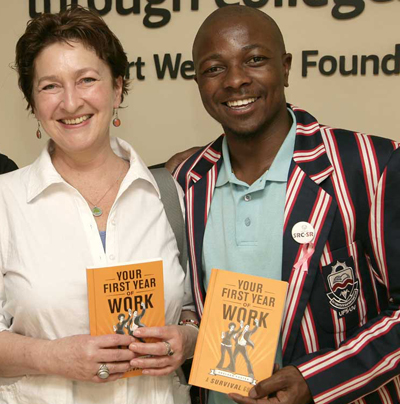 |
Attending the information session were, from the left: Shelagh Foster and Phiwe Mathe, SRC president of the Bloemfontein Campus.
18October 2013
Photo: Johan Roux |
Getting a foot in the door with potential employers is a struggle for the inexperienced, more so for fresh out of school graduates who don't know how to put a CV together, can’t spell or dress properly when meeting employers.
Launching her book Your First Year of Work: A Survival Guide, communications expert Shelagh Foster highlighted these facts and others during an information session on the Bloemfontein Campus. Students who attended gained a wealth of information from her and Prof Jonathan Jansen, Vice-Chancellor and Rector, who shared tips on how to prepare for the workplace and be successful in their job search.
Shelagh explained how a request from a graduate to do an internship at Media Online, where she had formerly worked as editor, made her decide to teach jobseekers the basics of verbal and written communications. She told the audience that the e-mail request from a female student, was littered with mistakes and left her with questions such as "what if she is really smart, has something to offer the company, but just don't know how to send an e-mail?"
Practical advice she gave, include dressing properly for a job interview, knowing who you communicate with when addressing an e-mail, as well as finding out as much as possible about the company you are applying to.
* Your First Year of Work: A Survival Guide addresses the unwritten codes that exist in the workplace that need to be understood by interviewees and new employees battling to get ahead once they've finished with matric or university.